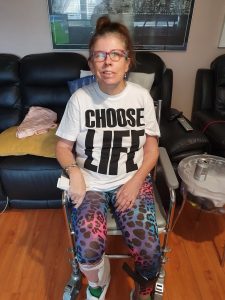A healthcare assistant from Brighton has told how her world was turned upside down when she had a severe stroke and her family thought she was going to die.
Maria Knight, 52, from Mile Oak, is determined to rebuild her life after the haemorrhagic stroke – a bleed on the brain – left her paralysed down her left side.
She is among the one in five stroke survivors in the south east whose stroke cost them their job, a figure that emerged from research by the Stroke Association.
The charity has shared the results of the study, with World Stroke Day just nine days away – on Friday 29 October.
Mrs Knight’s stroke struck while she was out driving with husband Dean, 57, in November last year.
She said: “I was driving into Caremark, where I work, in Old Shoreham Road, and my right arm just fell off the steering wheel.
“Dean was with me. He got me out of the car and I was leaning to the right. He couldn’t hold me up. A guy in the car behind got out to help and somebody brought a chair out for me to sit on.
“The ambulance took me to the Royal Sussex County Hospital. They wanted to operate on me but the bleed was too deep. Two days later it started to bleed again.
“The consultant thought my lights were going out, that I was going to die. Dean was holding my hand and I wasn’t responsive.
“My family thought that was it. Miraculously, it wasn’t. I feel like my family in Heaven sent me back.”
After three months in hospital, including a spell at the Princess Royal Hospital, in Haywards Heath, and a mild case of covid-19, Mrs Knight was sent home to be cared for by the community neuro rehab team at Brighton General Hospital.
The stroke has left Mrs Knight unable to walk properly, with left-sided weakness in her leg, arm and hand. She has drop foot and needs to wear a splint on her left leg.
She said: “I was very depressed and felt suicidal at one point. I was in a hospital bed at home and I thought ‘Is this it for the rest of my life?’
“I contacted my GP and he was brilliant – and the support from Dean and my daughters Hayley and Heidi has been tremendous. They have really given me hope.”

At first Mrs Knight relied on a zimmer frame but is slowly building up her strength and now uses a quad stick, a walking cane with four small feet for stability.
One of her first milestones was when she managed to walk the path from her front door to the road.
She said: “I was frightened of doing it but the rehab team were brilliant. I was taught breathing exercises to calm my nerves and relax me. It took me ten minutes to walk and touch the car and back but I did it and it was exhilarating.
“I decided that my stroke is not going to define me. I’m going to battle it. It’s a new chapter in my life and with determination and exercise I can get through this.
“I can walk to the car and where it’s flat but when I go to the supermarket I have to use a wheelchair or it would take us too long to get round.
“I’m trying to get back to normality. Hopefully next year I will be able to go for a driving assessment and I’m looking forward to being able to go on holiday to Turkey again because we love it there.
“I don’t know if I’ll ever be able to work again. Who knows? I miss feeling needed and making a difference and the camaraderie with the people I work with.
“The Stroke Association have been tremendous, especially my stroke support co-ordinator Marie. I could cry when I think about how much they’ve helped me.
“She checks on me every week and given me lots of useful information to help me with my recovery. I’ve been talking to other Brighton stroke supporters in a WhatsApp group Marie created and there’s a stroke group in Hove which is just restarting again after the Covid lockdown.
“I’ve also been having weekly phone calls from a Stroke Association volunteer through their Here for You scheme and chatting online to other stroke survivors which has really inspired me.”
Mrs Knight is sharing her story to support the Stroke Association’s Hope After Stroke campaign.
Vic Meynell, associate director, at the Stroke Association said: “Every five minutes, someone in the UK will have a stroke and, in a flash, their life is changed.
“Two thirds of people who survive a stroke find themselves living with a disability. The physical impact of a stroke is severe but, for many, the emotional aspects of coming to terms with having a stroke are just as significant.

“As the research makes clear, finding hope is a crucial part of the recovery process. Without it, recovery can seem impossible.
“At the Stroke Association, we support and help people to find this hope, and rebuild their lives. But with 1.3 million people and rising in the UK now living with the effects of a stroke, our services have never been more stretched.
“We urgently require the support of the public to help us continue to support stroke survivors to rebuild their lives.”
The Stroke Association is asking those who can to donate today so that it can reach more stroke survivors and give them the specialist support they need to find hope and move forward with their recovery. To donate, visit stroke.org.uk/hopeafterstroke.









